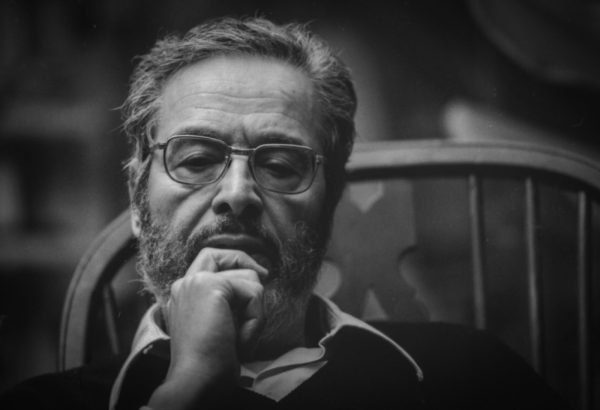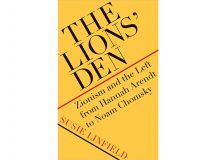Albert Memmi, who died recently, was a Jew, an Arab, a Zionist, an anti-colonialist, a secularist, a socialist, a nationalist, and a universalist. Whitman’s expression ‘I contain multitudes’ might have been invented for him. He was also one of the most important intellectuals of the second half of the twentieth century and perhaps, argues Susie Linfield, author of the acclaimed The Lions’ Den: Zionism and the Left from Hannah Arendt to Noam Chomsky, the one we need the most today, not least because he can teach us how to live together. A selected list of Memmi’s writings is appended.
On 22 May Albert Memmi, the Tunisian-born writer, died in Paris at the age of 99. He was eulogised as the last of the generation of the intellectuals that included Albert Camus and Jean-Paul Sartre – both of whom wrote introductions to his books; that generation also included thinkers like Maxime Rodinson and Isaac Deutscher, who, like Memmi, struggled with the question of Zionism, albeit in very different ways. Memmi is sometimes described as ‘neither right nor left,’ but this is a misnomer. He always considered himself a leftist: ‘I continue to think that socialism is the only honorable, probably the only effective, road open to humanity,’ he wrote in 1966. ‘We [Jews] were, in a way, condemned to the Left.’ Even after the Left’s rancor towards Israel became widespread, Memmi affirmed this attachment. Socialists, he wrote in 1975, ‘are my people, their ethics are mine, and I hope to build with them a world for all; it is among them that you will find the greatest number of Jewish intellectuals, and that is fine’. As far as I know, he never wavered in this commitment.
But his was a Left firmly rooted in the Enlightenment values of universal human rights. In this sense, I would place Memmi beside thinkers like Primo Levi and Jean Améry. In one of Améry’s last essays, he expressed a thought that clearly guided Memmi too: ‘Together with the skepticism that … rather ingeniously complements it, the benevolent optimism of the Enlightenment, with its constant values of freedom, reason, justice, and truth is our sole hope of making history … Enlightenment is … the constant illuminating dialogue that we are obliged to conduct with ourselves and with others.’ Memmi’s last book, Decolonization and the Decolonized (2004), was written in what I would call an Améryian spirit. In it, Memmi fiercely criticised the depredations of many post-colonial regimes, including dictatorship, torture, women’s oppression, religious fanaticism, economic exploitation, and intellectual sterility; this was not a departure from his leftism but a reaffirmation of it.
Memmi’s astonishingly long career as a writer and thinker – as essayist and novelist – contained multitudes; he wrote about colonialism and anti-colonialism, racism, the Jewish condition, Arabs and Jews, domination and dependence, among many other topics. Here I would like to concentrate on the quality of his thinking, from which I think we could learn so much today, and to place him in the context of several other thinkers.
Much has been made of Memmi’s insistence on his multiple ethnic, or national, identities. He was simultaneously Jewish, Arab, and French: ‘I do not think I have ever failed this triple agenda.’ (His political identities were also multiple and, he insisted, not in contradiction: He was a Zionist, an anti-colonialist, a supporter of Third World revolutions, a secularist, a socialist, a nationalist, a universalist.) But these national identities were not just an easy form of multiculturalism, as might be imagined today. In fact, they weren’t easy at all, and they existed in a constant dialectic: ‘All of my work has been in sum an inventory of my attachments; all of my work has been … a constant revolt against my attachments.’ Like the Lebanese-French writer Amin Maalouf, who insisted that ‘every individual is a meeting ground for many different allegiances,’ Memmi understood that multiple identities are not a form of personal expression but an existential necessity. Singular identities, reductionist identities, truncated identities: all set us on the deadly road to fundamentalism. ‘It is possible to be Jewish, Tunisian, and French all at once,’ Memmi wrote. ‘In any case this type of thing is necessary if we wish to stop killing each other. If people finally accepted being this and that, and not this or that, admitting at the same time that others can be both this and that, and are not obligated to be only this or only that, so many tragedies would be prevented! This would mean that we had finally learned to live together.’ In his last book, Memmi insisted that, in a globalised world, living together was now a pragmatic imperative. ‘We must convince ourselves of our solidarity. In the world that is being constructed day by day, no one can go it alone. Solidarity is not only a philosophical and moral concept, it is a practical necessity.’
Memmi opposed all forms of abstraction and sentimentality (the former is, in fact, an expression of the latter). Though a humanist, he well understood that the concept could be a shield behind which the dominators could hide and, thereby, preserve their power. Racism and colonialism were structural – and therefore require structural abolition; Memmi criticised the ‘indignation of sentimental anti-racism, which achieves as little as it costs.’ (I write this as tens of thousands of anti-racism protestors fill my country’s streets.) The comforts of humanism could too easily create a sense of false unity, or an ersatz equality: ‘Humanism, yes, but humanism after the liberation and not this fake humanism, a one-way street where I must consider all men as saints in a humanity in which I still have no place.’
Memmi was suspicious of the siren song of ‘universalist messianism’ – the temptation ‘to deny to the utmost all singularities, all those accursed differences which stand in the way of communion between men’ – which he saw as particularly alluring for Jewish intellectuals. ‘Universal man and universal culture are after all made up of particular men and particular cultures.’
At the same time, although he firmly believed in the necessity of national political formations – and, therefore, of Zionism – he was suspicious of the ways in which they could morph into tribalism, ethnocentrism or, in the current parlance, identity politics: ‘The excesses and errors of singularity must also be denounced.’ He worried that ‘a new singularity’ might ‘erect itself as a universal’ – the very essence of identity politics, which privileges certain identities (and their sufferings) as moral absolutes. Once again, then: the dialectic.
Learning through experience, rather than trying to force experience into ideology, was a key to Memmi’s ethos. From the Tunisian revolution – which he enthusiastically supported, and never disowned – he learned to be neither a populist nor a vanguardist. In Tunisia, working-class Jews – ghetto Jews – clearly intuited that a free Tunisia would not be a secular republic, and would make no place for them; it was the Jewish intellectuals who deluded themselves on this question. This experience humbled Memmi, and it rooted him deeply in the reality principle. Decades later, it was the reality principle that enabled Memmi to see – far before many other analysts – why the Arab Spring rebellions would fail. In February, 2011, just a month after the fall of Tunisia’s dictator and when the ‘Spring’ was in full swing elsewhere, Memmi presciently wrote: ‘What is very positive is that the Muslim Arab intellectuals can now express themselves, but the basic problem remains intact: corruption, tyranny, and above all the impossibility up to now of separating religion from politics. As long as the Muslim Arab world has not made this separation, I am afraid that things will not change very deeply.’
More humility: Memmi admitted that he had often bet on the wrong horse, and he was willing to interrogate himself on the most painful subjects. ‘Am I a traitor?’ he asked in a 1962 article that explored the relationship of North African Jews to their Arab compatriots. Memmi’s answer was, essentially, ‘yes.’ For Arab Jews, it was Europe, rather than their native countries, that represented freedom and modernity: ‘The Arabic culture and language, the Oriental customs … These were the past, a past of historical gloom, of fear, and of economic and cultural poverty.’ But his greatest humility lay in his resistance to dogma (and dogma is, in the end, a form of arrogance). In a 1996 interview, Memmi discussed how, as he travelled and gave talks, ‘They ask me the same question: are the things I wrote still valuable? And I tell them, roughly, yes. But be careful.’ He quickly explained, ‘You can’t apply a schema, as the Marxists believed. The result is the gulag.’
Memmi came of age in a Left that rejected terrorism against civilians; he never wavered in this ethos, even as the Left began (and, in some places, continues) to exult in, or at least tried to rationalise, the barbarism of shattered bodies. In his first nonfiction book, The Colonizer and the Colonized (1957), he described the gyrations of leftist intellectuals faced with so-called revolutionary terrorism.
We know that leftist tradition condemns terrorism and political assassination. When the colonized uses them, the leftist colonizer becomes unbearably embarrassed … The leftist colonizer tried in vain to explain actions which seemed incomprehensible, shocking and politically absurd. For example, the death of children and persons outside of the struggle … At first he was so disconcerted that the best he could do was to deny such actions … That it could be the cruelty of oppression which explained the blind fury of the reaction hardly seemed to be an argument to him; he can’t approve acts of the colonized which he condemns in the colonizers because these are exactly why he condemns colonization.
And in his last book, written almost five bloody decades later – when suicide bombing had metastasised around the globe – he reaffirmed:
The Muslim kamikaze wants to kill not only himself but the greatest number of people possible, guilty and innocent, combatants and. non-combatants alike. These two deaths are linked: since he does not care about his own life, he need not concern himself with that of the others … But heroes do not renounce life, they risk it … The suicide bomber denies the rules so painfully acquired by human societies, the outline of a moralization of war. It is a reversal of the gradual humanization of human societies … Islamic terrorism appears to have declared war on the entire world, including the Arab countries that fail to align themselves with its objectives.
As for Zionism: Memmi was both right and wrong. He was a lifelong left-Zionist; Israel’s deep flaws never led him to question the validity and necessity of a state for the Jewish people, just as the post-colonial dictatorships never led him to renounce the validity and necessity of the anti-colonial revolutions. Memmi was proud, and pleased, that Jewish oppression, Jewish marginalisation, Jewish endangerment, had greatly lessened in the post-Shoah decades (a development that cannot be disentangled from the establishment of Israel): ‘So much the better for the Jews!’ he exclaimed in a 1996 interview. But he fully expected Israel to be a secular state rooted in modern, democratic, rational politics. Zionism, he believed, was the enemy of ‘chosenness’ and would eradicate any need for Jewish chauvinism or Jewish mysticism. He was a lifelong supporter of a Palestinian state. I believe that he must have treasured the Israel of today with its thriving economy, its revitalised language, its vibrant culture; the Israel of the Occupation, political corruption, messianism, racism, and tribalism was anathema to all that he stood for.
Finally, Albert Memmi always focused on the human condition – and the individual within it. Colonialism, racism, anti-Semitism were bad not because they were ‘reactionary’ or ‘counterrevolutionary’ but because they degrade both the dominated and the dominators and, therefore, obliterate any possibility of being fully human. Exploitative economic conditions must be eradicated, Memmi believed, and in this sense, he avowed, ‘Marx is right.’ But he wasn’t completely right. ‘There are always things in the cultural domain that can’t be accounted for in strictly economic terms,’ Memmi continued. ‘People don’t buy tickets to go to the movies because they have the money, but because they need to dream.’
Books (and Selected Articles) by Albert Memmi, in English translation
‘Am I a Traitor?’ Commentary, October 1962.
The Colonizer and the Colonized. Translated by Howard Greenfeld. Boston: Beacon Press, 1967.
Decolonization and the Decolonized. Translated by Robert Bononno. Minneapolis: University of Minnesota Press, 2004.
‘Does the Jew Exist?’ Commentary, November 1966, 73-76.
Dominated Man: Notes Toward a Portrait. Boston: Beacon Press, 1968.
‘Growing Up as a Minority Child,’ Translated by Ralph Tarica, Sephardic Horizons, 2008.
‘The Impossible Life of Frantz Fanon,’ Translated by Thomas Cassirer and G. Michael Twomey, The Massachusetts Review, Vo. 14, No. 1 (Winter 1973), 9-39.
‘Irreconcilable Differences,’ Transition, No. 71 (1996), 158-177.
Jews and Arabs. Translated by Eleanor Levieux. Chicago: J. Philip O’Hara, 1975.
‘Jews, Tunisians, and Frenchmen.’ Literary Review vol. 41, no. 2 (Winter 1998): 223-227.
The Liberation of the Jew. Translated by Judy Hyun. New York: The Viking Press, 1973.
The Pillar of Salt. Translated by Edouard Roditi. Boston: Beacon Press, 2001.
Portrait of a Jew. Translated by Elisabeth Abbott. New York: The Viking Press, 1971.
Racism. Translated by Steve Martinot. Minneapolis: University of Minnesota Press, 1999.
The Scorpion, or, The Imaginary Confession. Translated by Eleanor Levieux. New York: Grossman, 1971.
Strangers. Translated by Brian Rhys. New York: Orion Press, 1960.
‘Who Is an Arab Jew?’, February 1975, http://www.sullivan-county.com/x/aj1.htm




































Comments are closed.